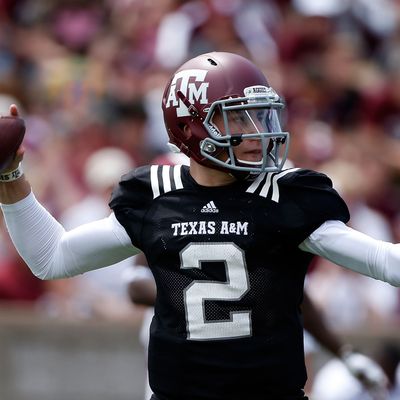
In case you haven’t heard, Texas A&M quarterback and Heisman Trophy winner Johnny Manziel was caught selling his autograph this summer, a violation of NCAA rules, and not a day has gone by without somebody writing a column assailing the hypocrisy of the rule and demanding that college athletes be allowed to engage in such transactions. Neil Irwin’s entry is today, but it doesn’t differ in any important respects from the wave of columns making this case.
Their argument is incredibly simple and obvious. Manziel created his own fame. Why can’t he profit from it? Just let him sell his autograph!
And, yes, if we could change the rules so players sold a few autographs to dealers from time to time, there would be no harm done. What I haven’t seen Irwin or any of the pundits making this same point acknowledge is that changing this rule would change the underlying dynamic in more far-reaching ways. It’s not more wrong for Manziel to sell his autograph than it is for a poor person to steal a loaf of bread to feed his starving family. But sometimes rules like this exist for a reason.
The reason rules like that exist is to prevent boosters of the programs from illicitly paying players. The NCAA has rules designed to ensure that college athletes can only get jobs that regular students could also get. You can work as a mover at a furniture store, but you can’t get paid $100,000 to play for some corporate softball team. If you allowed athletes to sell their fame, pretty soon every major college that competes in high-level sports would have a network of boosters who turn “selling autographs” into a loophole for buying up recruits. (Irwin — again like many others — brings up the example of the Olympics, which relaxed its amateurism rules, but the Olympics doesn’t have the same booster-recruiting competition dynamic.)
Now, judging from the rest of his column — college sports is a “fraud,” etc. — Irwin is probably perfectly fine with letting boosters just openly pay college athletes. The whole concept of amateurism, he writes, “makes no sense to me; the precise pay arrangements of the people on the field don’t really matter if you’re the one in the stands watching what you hope will be an entertaining game.” But if college sports would work just as well if it’s turned into a minor league, why aren’t minor-league sports popular? I can’t think of a single example anywhere in the world of a minor-league sport that even approaches the popularity of the major-league version.
The reason college athletics is the sole exception is that it’s college athletics, and not a minor-league sport. The top 500 college players could drop out and form their own league, but, like the NBA Developmental League, nobody would watch it, even if the quality of play was higher than college football. Now, the whole idea of college sports tends to baffle people from the northeast who attended small private schools [apparently St. Mary’s College is a small public school; my apologies], but the ideal is very much part of the value of it. People who think college sports is already just a crappier version of pro sports are people who don’t like college sports. This also suggests that making college sports into explicitly a minor-league version of the pros would eliminate its appeal.
Now, the college-sports ideal is also under a pretty serious threat from the rampant marketization of college sports. The vast majority of college athletes, even the majority of men’s football and basketball players, actually want a college education. They’re not idiots. They understand the economic value of a college degree. The reforms I’d like to see would be to protect their ability to get a real education while meeting the intense, growing demands of playing varsity sports. Right now, the least scrupulous programs actually cut players who don’t develop into useful roster additions. Expanding the marketization of college sports would make all this far worse. The solution is less marketization, not more.






























